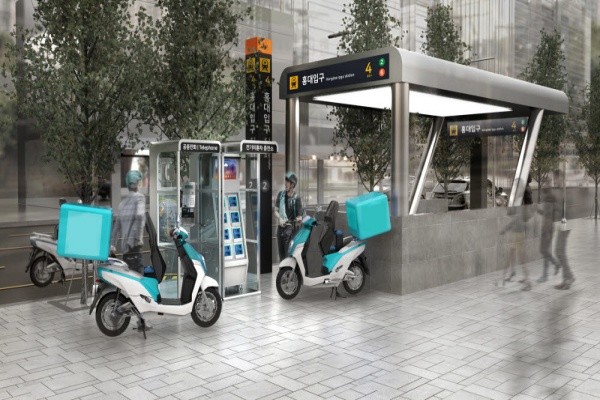The South Korean Government has decided to replace public telephone booths with electric scooter battery swapping stations.
Its decision is drawing attention as it resembles an innovative mobility model that utilizes public telephone booths that have great accessibility as one of many ways to expand South Korea’s eco-friendly mobility market.
According to the industry on Tuesday, the Ministry of Environment’s Korea Environment Corporation (KECO) recently selected a consortium made up of Signet EV, AJ Bike, and Daelim Motorcycle as the consortium that will oversee its “Battery Swapping Charging Station” project. The consortium will replace 30 public telephone booths in Seoul and other metropolitan cities with battery swapping charging stations by the end of April next year.
These stations are expected to be set up mostly around residential facilities, universities, and commercial facilities where there are high demands for deliveries. Depending on a location, charging stations will be available either as common stations or local and general stations.
Battery swapping service will be available for customers who purchased Daelim Motorcycle’s electric scooters that have different battery packs from other electric scooters. Customers can simply exchange the batteries that need charging with batteries that are fully charged at these stations and they do not have to wait a long time and can exchange batteries as often as they desire.
Because the service will swap batteries that are largely responsible for production cost of electric scooters, it will be South Korea’s first sharing economy-type eco-friendly mobility service model that can lower electric scooter prices.

Total of eight battery packs can be charged and exchanged per charging station. Each battery pack has a capacity of 1.44 kWh and two of them can be attached and detached from each electric scooter. Electric scooter with two of these battery packs have a range of about 100 kilometers.
MisumSystech will be the one that will manufacture the battery packs using Samsung SDI’s lithium-ion battery cells and provide them to the consortium.
The consortium plans to manage a TOC (total operation center) for various safety reasons and effective management of electric scooters and charging stations.
The industry expects that the market for electric scooters with replaceable batteries will start to grow when the project is officially launched.
Although there is yet to be any battery pack that is optimized for exchange and standard for electric scooter battery swapping facilities in South Korea, it is expected that necessary standards and appropriate battery packs will be developed with this project as the launching pad.
The consortium will look to raise the project’s commercial value by adding rental and leasing service and maintenance service rather than simply increasing supplies of electric scooters.
“This project will be the first eco-friendly sharing economy business model in South Korea.” said Lee Choong-ryeol who is the head of Signet EV’s headquarters. “We are going to collect reliable data on how each charging station is being used and contribute to vitalizing supply of electric scooters by making charging stations free of charge during a test operation.”
Staff Reporter Park, Taejoon | gaius@etnews.com